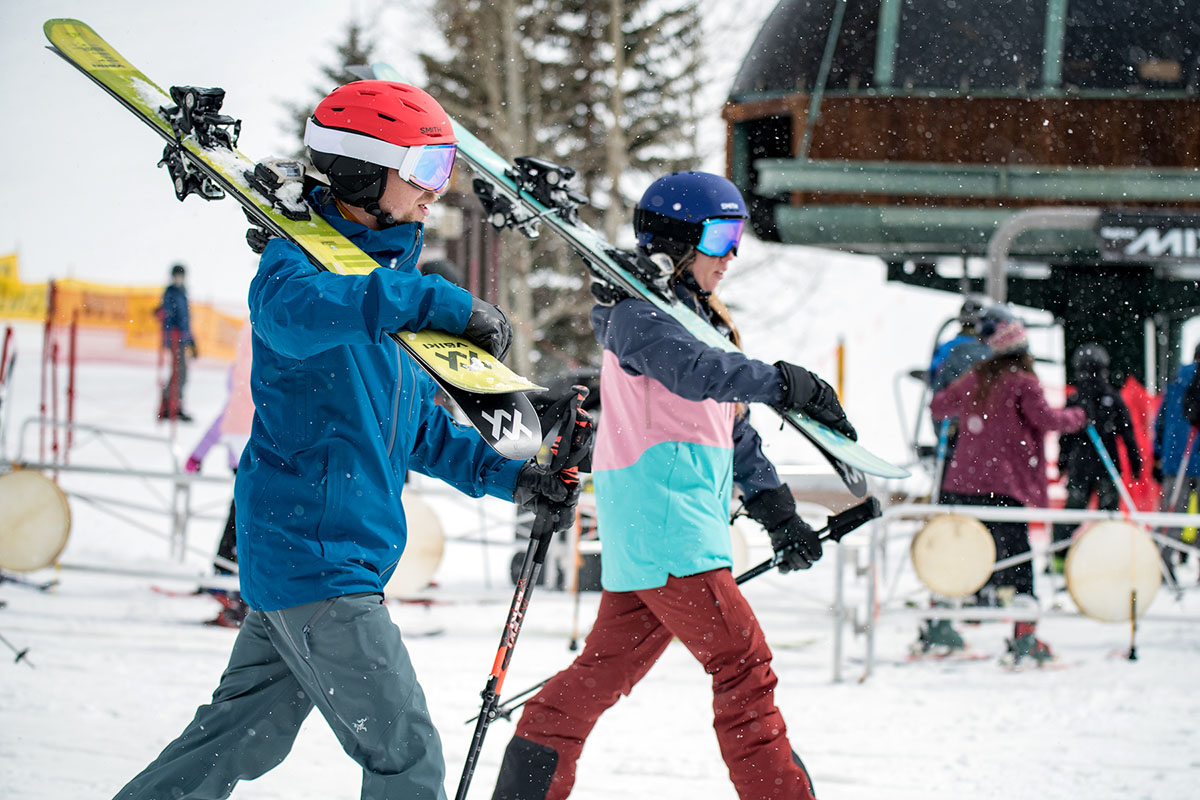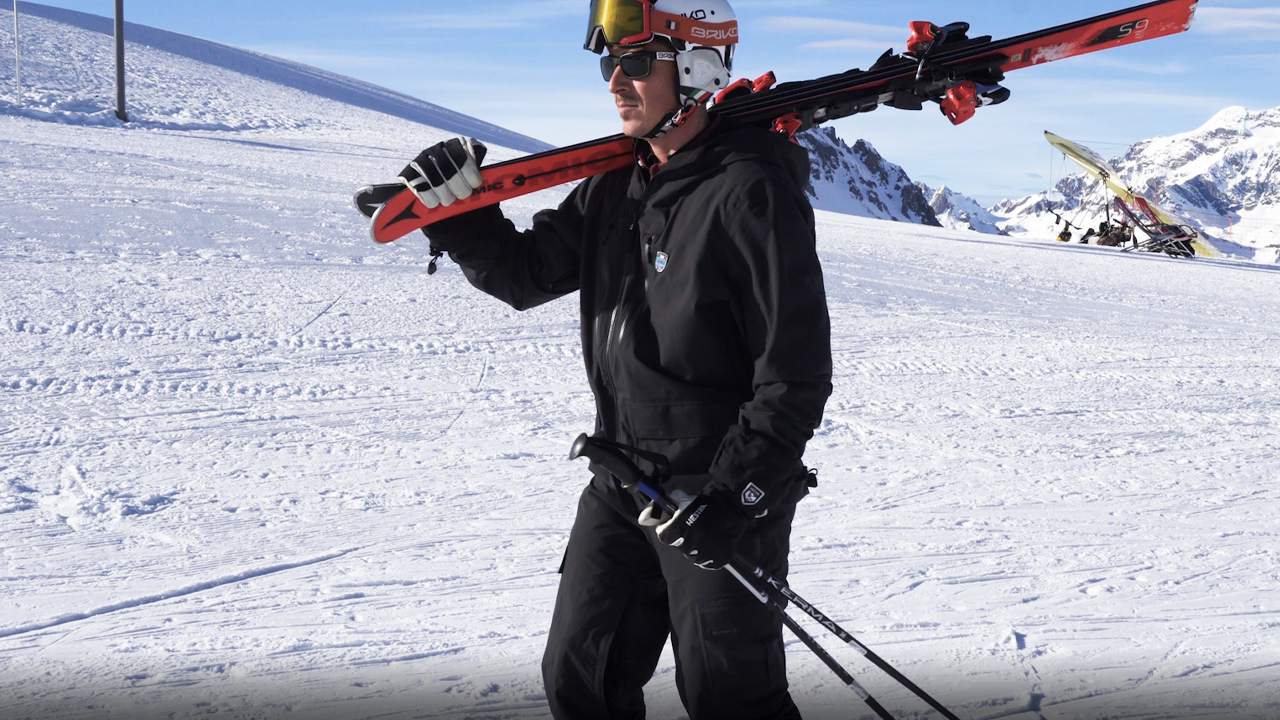
Cross-country skiing is a low-impact, fun activity that's suitable for all ages. Because they use all major muscles and are aerobic, cross country skiing is a great way for people to keep fit. It's easy and simple to get started. It is important to have the right equipment.
First, choose the right binding and ski for you. If you're a beginner, it might be worth looking at ski poles and boots. Consider what terrain you are looking to ski on. Flat terrain is better for beginners.
Balance is the most important part about skiing. Balance is key to controlling your body. You can help accomplish this by bending your hips and knees. This will give you more control and help prevent injury.

Consider also the type of wax you are using for your cross-country skis. There are different types of wax, from grip wax to glide wax. Glide wax works well for downhill skiing; grip wax is great for uphill skiers.
When choosing the right cross country skis, you should also consider the style of skiing you want to do. There are two main styles: classic and skate. Classic cross-country skiing is done on a set of tracks that are groomed, while skate skiing is done on snow that has been tracked.
For beginners, you should get a pair that is both short and long. These can help you get a grip on the snow and prevent you from getting hurt. Choose a pair that is at least 5cm wider than your height. If you are heavier than average, add at least 5cm to your skis' length.
As for gloves, you should wear gloves that keep your fingers warm. A pair of warm socks is also a must. Blisters can happen if your feet become too cold. Layers are also a good idea. The outer layer should be lightweight and windproof. Next, the inner layer should be breathable.

Also, it is a smart decision to purchase a pair of quality ski poles. A quality pair of ski poles will be adjustable so you can change their length to fit your needs. Keep your poles close to your body so that they will not be waving around.
You should also choose a pair of boots that is comfortable. Avoid boots that are too tight, as they can cause blisters. Boots that are too tight can cause blisters. The wrong boots can hinder your cross-country experience.
Don't forget to bring a small bag and a cup of tea. Your legs will sweat, so you'll need breaks. You will need to cool your legs after a long, tiring day.
FAQ
What should you do the first time you arrive at your travel destination after you have arrived?
It is a good idea to have a plan for when you get to a destination. It helps you know what to expect and where to go next.
It is important to plan ahead so you don't forget anything.
You should also research what museums, parks, or landmarks you want to visit if you are planning to visit a city more than once.
A map of the area is a great way to start researching the region's past.
What should vacationers bring?
Know what you want to do while on holiday. You don't just need to pack clothes. Also, think about where and how long your stay there.
Consider what type of activities you'd like to take part in. Scuba diving is a great option if you're going to exotic destinations. Participating in local festivals or events is a good idea if you're planning on staying somewhere for a longer time.
If you have any health issues, then it is important that you tell the people who will be looking after you so they can plan accordingly.
Where can I store my luggage safely?
There are many choices. Most people use airport lockers. These are typically located near the security zone. They cost between $5-10 per day, depending on the locker size.
Another option is to rent a storage unit. These units are commonly found outside shopping centers or large hotels. While prices can vary, there are some places that offer discounts for multiple units being rented together.
Another option is to hire porters. A porter will transport your luggage from the carousel into your room. A small fee is charged each time the porter helps you.
What is the average time it takes to fly between two countries.
The distance between two airports and the weather conditions affect the time taken to fly.
Average flight time is 3 hours.
However, the actual flying time depends on several factors such as the airline, the aircraft type, airport delays, and weather conditions.
What can I put in my suitcase for travel?
Always have at least two pairs. You need one pair for walking in the city; another pair to go on vacation.
Also, make sure to have enough clothing for both. You should also ensure you have enough clothes for plane travel.
Consider bringing some clothes if you are planning to stay somewhere for a longer time. You won't feel uneasy when shopping for new outfits.
If you're taking a bus or train, you'll need to bring some comfortable shoes. You'll also need to bring a spare set if you are driving.
You'll also need to pack plenty of toiletries such as soap, shampoo, toothpaste, deodorant, and moisturizer.
Finally, don't forget a flashlight, insect repellents, sunscreen, sunglasses, a hat and a first-aid kit.
Make sure you have all the items in one bag. By doing so, you can save time and space.
Also, be sure to take a small washcloth and towel. These will come in handy after a long day sightseeing.
You should not forget these things when you travel.
When you travel, you'll find yourself in situations with little time to make decisions. You should be ready to improvise.
You might be stuck somewhere for hours, days, weeks, or even months. If you've planned ahead, you'll have food, water, shelter, and a place to sleep. But, if not, you might have the need to improvise.
In these situations, you will probably need to rely upon what you know best. This means that you will need to make quick decisions based on your intuition and experience.
But there are times when you can't choose. You might find yourself in an area without cell service, out of gas or robbed. In these cases, you will have to adapt quickly and respond to any situation.
It is important to remain calm, keep your eyes on the prize and be decisive. Don't panic. Instead, stay focused on what you have control of.
For example, if you're lost in the woods, you can choose which direction to go. Or if you're hungry, you can eat berries or mushrooms. You can also drink rainwater and melt snow if you feel thirsty.
If you are tired, you can take a break. If you're cold, you can bundle up. You can also change your clothes if you are wet. You'll feel happier if you remain positive, no matter what your decision.
Statistics
- Pack sweaters, jackets, and underwear in reusable compression bags creating up to 75% more space in your luggage. (wikihow.com)
- Case in point: the private island of Ilha Caldeira, less than seven miles off the coast as part of the Primeiras and Segundas Archipelago, is located within the marine-protected area with 20 percent of the country's intact living coral. (travelandleisure.com)
- Between the ages of 11 and 13, kids, or tweens, will likely want some autonomy but also need boundaries. (travelandleisure.com)
- You can use compression sacs or cubes to reduce the volume of your clothes by up to 80%—this is especially convenient for bulky items such as sweaters and jackets. (eaglecreek.com)
- They're also likely to offer babysitting services, in case you'd like to have dinner one night after 7 p.m. (travelandleisure.com)
External Links
How To
Which are the best travel tips and tricks for beginners?
It's an exciting time to travel, but there are many dangers you should avoid if your goal is to make it a safe and enjoyable experience.
Here are some basic tips to help you plan your next vacation.
-
Make sure to book early. The prices will be lower if you book early. Avoid last-minute offers by airlines and hotels to save money.
-
Stay-at-budget accommodations. Hotels at a lower price offer more value. These hotels are often located close to shopping and public transportation.
-
Don't overpack. Don't overpack. Keep room for souvenirs. You should wear clothes that fit comfortably and don't wrinkle easily.
-
Be sensible. Don't wander around at night if you are traveling solo. Avoid dangerous neighborhoods and areas with high levels of crime.
-
You can take precautions to prevent theft. Keep valuables safe from prying eyes. When you swim, don't leave valuables unattended.
-
Be careful with cash. Tourists living in foreign cities are often the target of thieves. Keep your money out of view and use ATMs inside banks or guarded facilities.
-
Be familiar with your surroundings. Prior to booking a room in a hotel, make sure you understand how public transport works. Find out about tourist attractions, restaurants, and other sights.
-
Be sure to learn about safety. Before you go, find out about the local laws, customs and culture.
-
Have fun. Enjoy yourself, no matter what happens. It is worth it.